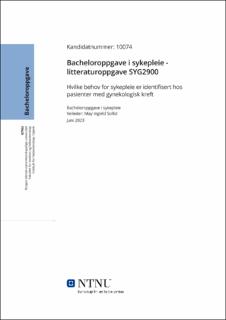Hvilke behov for sykepleie er identifisert hos pasienter med gynekologisk kreft
Bachelor thesis
Permanent lenke
https://hdl.handle.net/11250/3082765Utgivelsesdato
2023Metadata
Vis full innførselSamlinger
Sammendrag
HensiktOppgavens hensikt er å belyse hvile behov for sykepleie er identifisert hos pasienter med gynekologisk kreft. Samtidig bidrar til økt kunnskap om hvilke tiltak sykepleiere kan gjør, for å bedre hverdagen og livskvaliteten til pasienter med gynekologisk kreft.
MetodeDet ble utført en systemisk litteratursøk i to databaser. Seks kvantitative artikler og en kvalitativ artikkel ble plukket ut og analysert med utgangspunkt i Aveyards tematiske analyse.
ResultatPasienter med gynekologisk kreft erfarte flere ubehagelige symptomer som: smerte, kvalme, diaré, obstipasjon, fatigue, insomni og dårlig appetitt. I tillegg kom depresjon, angst og bekymring frem som psykisk byrde. Symptomer som smerte og kvalme viser seg å bli hyppigst behandlet av helsepersonell. Videre ble det identifisert et behov for god kommunikasjon og informasjonsflyt, mellom pasient og helsepersonell og mellom helsepersonell. Flere pasienter savnet informasjon til pårørende. To av tre pasienter oppnår ikke den anbefalte aktivitetsnivået, noe som gir konsekvenser for den fysiske og psykiske helsen til pasienten.
KonklusjonPasienter med gynekologisk kreft har behov for god symptomlindring, kommunikasjon og informasjon, fysisk aktivitet og psykisk støtte. Som sykepleier på sengepost kan det viktigste tiltak være å svare på spørsmål og trygge pasienten ved bekymring og usikkerhet. I tillegg kan sykepleier informere om hvem de kan henvise seg til ved spørsmål etter utskrivelse AimThe aim of this study is to shed light on the need of nursing care identified in patients with gynecological cancer. At the same time contribute to knowledge about what measurements nurses can take, to improve the everyday life and quality of life of patients with gynecological cancer.
MethodA systemic literature search was carried out to in two databases. Six quantitative articles and one qualitative article were selected and analyzed based on Aveyard’s thematic analysis.
ResultPatients with gynecological cancer experienced several unpleasant symptoms such as: pain, nausea, diarrhea, constipation, fatigue, insomnia, and poor appetite. In addition, depression, anxiety, and worry emerged as psychological burdens. Symptoms such as pain and nausea appear to be the most frequently treated by healthcare personnel. Furthermore, a need was identified for good communication and flow of information, between patient and healthcare personnel and between healthcare personnel. Several patients missed information for next of kin. Two out of three patients do not achieve the recommended level of activity. This turns out to have consequences for the physical and mental health of the patient.
ConclusionPatients with gynecological cancer need good symptom relief, communication and information, physical activity, and psychological support. As a nurse on bedside duty, the most important measure may be to answer questions and reassure the patient in case of worry and uncertainty. In addition, nurses can provide information on who they can refer to in case of questions after they have been discharges.
